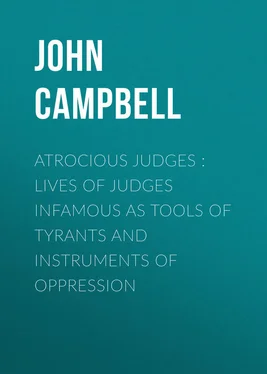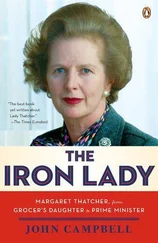John Campbell - Atrocious Judges - Lives of Judges Infamous as Tools of Tyrants and Instruments of Oppression
Здесь есть возможность читать онлайн «John Campbell - Atrocious Judges - Lives of Judges Infamous as Tools of Tyrants and Instruments of Oppression» — ознакомительный отрывок электронной книги совершенно бесплатно, а после прочтения отрывка купить полную версию. В некоторых случаях можно слушать аудио, скачать через торрент в формате fb2 и присутствует краткое содержание. Жанр: foreign_antique, foreign_prose, Биографии и Мемуары, на английском языке. Описание произведения, (предисловие) а так же отзывы посетителей доступны на портале библиотеки ЛибКат.
- Название:Atrocious Judges : Lives of Judges Infamous as Tools of Tyrants and Instruments of Oppression
- Автор:
- Жанр:
- Год:неизвестен
- ISBN:нет данных
- Рейтинг книги:5 / 5. Голосов: 1
-
Избранное:Добавить в избранное
- Отзывы:
-
Ваша оценка:
- 100
- 1
- 2
- 3
- 4
- 5
Atrocious Judges : Lives of Judges Infamous as Tools of Tyrants and Instruments of Oppression: краткое содержание, описание и аннотация
Предлагаем к чтению аннотацию, описание, краткое содержание или предисловие (зависит от того, что написал сам автор книги «Atrocious Judges : Lives of Judges Infamous as Tools of Tyrants and Instruments of Oppression»). Если вы не нашли необходимую информацию о книге — напишите в комментариях, мы постараемся отыскать её.
Atrocious Judges : Lives of Judges Infamous as Tools of Tyrants and Instruments of Oppression — читать онлайн ознакомительный отрывок
Ниже представлен текст книги, разбитый по страницам. Система сохранения места последней прочитанной страницы, позволяет с удобством читать онлайн бесплатно книгу «Atrocious Judges : Lives of Judges Infamous as Tools of Tyrants and Instruments of Oppression», без необходимости каждый раз заново искать на чём Вы остановились. Поставьте закладку, и сможете в любой момент перейти на страницу, на которой закончили чтение.
Интервал:
Закладка:
A verdict of guilty was pronounced against the prisoner, notwithstanding his solemn denial of ever having spoken these words. He then moved, in arrest of judgment, that the indictment was insufficient, as it did not properly follow the words of the statute which made it high treason to deny the king’s supremacy, even supposing that Parliament had power to pass such a statute. The lord chancellor, whose duty it was, as head of the commission, to pass the sentence – “not willing,” says the report, “to take the whole load of his condemnation on himself, asked in open court the advice of Sir John Fitzjames, the lord chief justice of England, whether the indictment was valid or no.”
Fitzjames, C. J. – “My lords all, by St. Gillian, (for that was always his oath,) I must needs confess that if the act of Parliament be not unlawful, then the indictment is not, in my conscience, invalid.”
Lord Chancellor. – “ Quid adhuc desideramus, testimonium? Reus est mortis. (What more do we need? He is worthy of death.) Sir Thomas More, you being, by the opinion of that reverend judge, the chief justice of England, and of all his brethren, duly convicted of high treason, this court doth adjudge that you be carried back to the Tower of London, and that you be thence drawn on a hurdle to Tyburn, where you are to be hanged till you are half dead, and then being cut down alive and embowelled, and your bowels burnt before your face, you are to be beheaded and quartered, your four quarters being set up over the four gates of the city, and your head upon London Bridge.”
No one can deny that Lord Chief Justice Fitzjames was an accessory to this atrocious murder.
The next occasion of his attracting the notice of the public was when he presided at the trials of Smeaton and the other supposed gallants of Anne Boleyn. Luckily for him, no particulars of these trials have come down to us, and we remain ignorant of the arts by which a conviction was obtained, and even a confession – although there is every reason to believe that the parties were innocent. According to the rules of evidence which then prevailed, the convictions and confessions of the gallants were to be given in evidence to establish the guilt of the unhappy queen, for whose death Henry was now as impatient as he had once been to make her his wife.
When the lord high steward and the peers assembled for her trial, Fitzjames and the other judges attended, merely as assessors, to advise on any point of law which might arise. I do not find that they were consulted till the verdict of guilty had been recorded, and sentence was to be pronounced. Burning was the death which the law appointed for a woman attainted of treason; yet as Anne had been Queen of England, some peers suggested that it might be left to the king to determine whether she should die such a cruel and ignominious death, or be beheaded , a punishment supposed to be attended with less pain and less disgrace. But then a difficulty arose whether, although the king might remit all the atrocities of the sentence on a man for treason, except beheading, which is part of it, he could order a person to be beheaded who was sentenced to be burnt. A solution was proposed, that she should be sentenced by the lord high steward to be “burnt or beheaded at the king’s pleasure;” and the opinion of the judges was asked, “whether such a sentence could be lawfully pronounced.”
Fitzjames, C. J. – “My lords, neither myself nor any of my learned brothers have ever known or found in the records, or read in the books, or known or heard of, a sentence of death in the alternative or disjunctive, and incline to think that it would be bad for uncertainty. The law delights in certainty. Where a choice is given, by what means is the choice to be exercised? And if the sheriff receives no special directions, what is he to do? Is sentence to be stayed till special directions are given by the king? and if no special directions are given, is the prisoner, being attainted, to escape all punishment? Prudent antiquity advises you stare super antiquas vias ; and that which is without precedent is without safety.”
After due deliberation, it was held that an absolute sentence of beheading would be lawful, and it was pronounced accordingly; the court being greatly comforted by recollecting that no writ of error lay, and that their judgment could not be reversed.
Fitzjames died in the year 1539, before this judgment served as a precedent for that upon the unfortunate Queen Catharine Howard; and he was much missed when the bloody statute of the Six Articles brought so many, both of the old and of the reformed faith, on capital charges, before the Court of King’s Bench.
CHAPTER V.
THOMAS FLEMING
The greatest part of my readers never before read or heard of the name of Thomas Fleming; yet, starting in the profession of the law with Francis Bacon, he was not only preferred to him by attorneys, but by prime ministers, and he had the highest professional honors showered upon him, while the immortal philosopher, orator, and fine writer continued to languish at the bar without any advancement, notwithstanding all his merits and all his intrigues. But Fleming had superior good fortune, and enjoyed temporary consequences, because he was a mere lawyer – because he harbored no idea or aspirations beyond the routine of Westminster Hall – because he did not mortify the vanity of the witty, or alarm the jealousy of the ambitious.
He was the younger son of a gentleman of small estate in the Isle of Wight. I do not find any account of his early education, and very little interest can now be felt respecting it; although we catch so eagerly at any trait of the boyhood of his rival, whom he despised. Soon after he was called to the bar, by unwearied drudgery he got into considerable practice; and it was remarked that he always tried how much labor he could bestow upon every case intrusted to him, while his more lively competitors tried with how little labor they could creditably perform their duty.
In the end of the year 1594, he was called to the degree of serjeant, along with eight others, and was thought to be the most deeply versed in the law of real actions of the whole batch. It happened that, soon after, there was a vacancy in the office of solicitor general, on the promotion of Sir Edward Coke to be attorney general. Bacon moved heaven and earth that he himself might succeed to it. He wrote to his uncle, Lord Treasurer Burleigh, saying, “I hope you will think I am no unlikely piece of wood to shape you a true servant of.” He wrote to the Queen Elizabeth, saying, “I affect myself to a place of my profession, such as I do see divers younger in proceeding to myself, and men of no great note, do without blame aspire unto; but if your majesty like others better, I shall, with the Lacedemonian, be glad that there is such choice of abler men than myself.” He accompanied this letter with a valuable jewel, to show off her beauty. He did what he thought would be still more serviceable, and, indeed, conclusive; he prevailed upon the young Earl of Essex, then in the highest favor with the aged queen, earnestly to press his suit. But the appointment was left with the lord treasurer, and he decided immediately against his nephew, who was reported to be no lawyer, from giving up his time to profane learning – who had lately made an indiscreet, although very eloquent, speech in the House of Commons – and who, if promoted, might be a dangerous rival to his cousin, Robert Cecil, then entering public life, and destined by his sire to be prime minister. The cunning old fox then inquired who would be a competent person to do the queen’s business in her courts, and would give no uneasiness elsewhere; and he was told by several black-letter judges whom he consulted that “Serjeant Fleming was the man for him.” After the office had been kept vacant by these intrigues above a year, Serjeant Fleming was actually appointed. Bacon’s anguish was exasperated by comparing himself with the new solicitor; and in writing to Essex, after enumerating his own pretensions, he says, “When I add hereunto the obscureness and many exceptions to my competitor, I cannot but conclude with myself that no man ever had a more exquisite disgrace.” He resolved at first to shut himself up for the rest of his days in a cloister at Cambridge. A soothing message from the queen induced him to remain at the bar; but he had the mortification to see the man whom he utterly despised much higher in the law than himself, during the remainder of this and a considerable part of the succeeding reign.
Читать дальшеИнтервал:
Закладка:
Похожие книги на «Atrocious Judges : Lives of Judges Infamous as Tools of Tyrants and Instruments of Oppression»
Представляем Вашему вниманию похожие книги на «Atrocious Judges : Lives of Judges Infamous as Tools of Tyrants and Instruments of Oppression» списком для выбора. Мы отобрали схожую по названию и смыслу литературу в надежде предоставить читателям больше вариантов отыскать новые, интересные, ещё непрочитанные произведения.
Обсуждение, отзывы о книге «Atrocious Judges : Lives of Judges Infamous as Tools of Tyrants and Instruments of Oppression» и просто собственные мнения читателей. Оставьте ваши комментарии, напишите, что Вы думаете о произведении, его смысле или главных героях. Укажите что конкретно понравилось, а что нет, и почему Вы так считаете.












